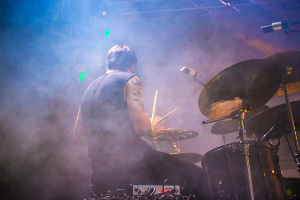How do we nurture the punk acts of the future?
12 September 2018

Music journalists and scholars in art and media will debate the lack of infrastructure to nurture emerging bands as artistic concepts at an upcoming conference.
The history and future of the ‘DiY music’, best known through major cultural movements like punk and new wave, will be discussed at the EuroNoize event on 21 September at the University of Reading.
The project will culminate in an ‘alternative Eurovision Song Contest’, bringing together art bands to explore global identities while representing their country on stage in London.
Dr Pil Kollectiv, lecturer at the University of Reading's School of Art and EuroNoize project lead, said: “Art bands are not quite art and not quite music, but have a foot in both worlds. This means they are often excluded from institutions and therefore seem to be falling through the cracks.
“At this event, we will look the history of the art band. We want to celebrate DIY music, which unites people from all over the world and has a big impact on culture, yet lacks recognition as an art form in its own right.”
EuroNoize is a collaborative project between the University of Reading, Kunsthall Oslo and A.R.E. Pargue, funded by the European Commission.
It was set up to research the relationship between art and DIY music scenes in Europe. DIY music originated in the punk rock scene of the mid 1970s, and is often produced by self-taught artists without formal training and distributed through independent labels and shops. Such movements are usually synonymous with particular aesthetics and fashion choices.
A lot of such bands have been forgotten because of the absence of archiving. Many of the better-known bands in this category, such as Roxy Music and Throbbing Gristle, have their roots in art colleges. Speakers at the Reading conference will discuss the relationship between DIY music and education, as well as the social, economic and cultural structures that shape it today.
The EuroNoize song contest in May 2019 will be live streamed online and will invite countries to enter a song and video. Viewers will be able to vote digitally to decide the winner.
In addition to these events, there will also be a EuroNoize exhibition, and a publication and a record will be produced in 2019.
Dr Galia Kollectiv, Art lecturer at the University of Reading and EuroNoize project lead, said: “Popular music has long been organised through an Anglo-American industry of hit producers, record labels and stars. But alongside sits a grassroots tradition of people appropriating and adapting this music according to local languages and cultures.
“This DiY music operates through under-recognised informal networks across Europe, often positioned uncomfortably between the cultural industries of art and music. Because this form of art is often unrecognised by larger institutions, it relies on a spirit of collaboration, co-operation and shared cultural practices that defies an age of anxiety hanging over Europe.”
One of the speakers at the event is Professor Matt Worley, University of Reading historian and author of No Future: Punk, Politics and British Youth Culture, 1976-84. He has conducted extensive research into the Punk era and also recently chaired the Writing the Noise conference on behalf of the Subcultures Network, where a range of speakers discussed the challenges of writing about youth culture movements and their associated music.
Visit euronoize.eu for more information.
